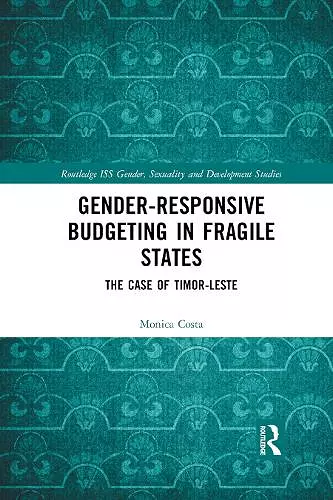Gender Responsive Budgeting in Fragile States
The Case of Timor-Leste
Format:Paperback
Publisher:Taylor & Francis Ltd
Published:12th Dec '19
Currently unavailable, and unfortunately no date known when it will be back
This paperback is available in another edition too:
- Hardback£145.00(9781138240650)

A growing number of governments have made commitments to achieving gender equality and women's rights, with many using gender responsive budgeting (GRB) to allocate resources for the delivery of economic policy and governance that benefit men and women equally. At a time when GRB is growing in global traction, this book investigates what it can deliver for gender equality and state resilience in contexts where the state is weak or prone to violence, such as in Timor-Leste.
Gender-Responsive Budgeting in Fragile States: The Case of Timor-Leste uses the Timor-Leste case to investigate whether gender equality reform can be adopted at the same time as establishing economic and institutional fundamentals. While some may have thought that the adoption of GRB strategy in 2008 was premature, Monica Costa argues that GRB initiatives have contributed to budget accountability and transparency, and ultimately improved policy and budget processes and decisions. This multi-disciplinary analysis of a decade of GRB demonstrates why GRB is important to inform the debate on state fragility-resilience and argues that fragile states cannot defer gender equality in the name of getting the economic and institutional basics right.
While a growing number of fragile states have taken steps to make their budget more gender responsive, questions remain for economists and policy makers about what can be achieved, and how. Gender Responsive Budgeting in Fragile States is the first international publication on GRB in fragile state contexts and will be of interest to researchers, upper level students, policy makers and NGOs with an interest in policy, economics, gender and development.
"This book makes a unique contribution by focusing on gender responsive budgeting in Timor Leste, a fragile state, recently emerged from years of conflict. It shows how GRB can make a positive contribution to both gender equality and state resilience. It is highly original in its reflection on how knowledge is produced and communicated; and in identifying the contexts and actors that enable effective translation of gender analysis into improvements in opportunities for women and girls. Essential reading for scholars and students of feminist economics and gender and development; and for development practitioners in international NGOs, aid agencies, and international financial institutions." — Diane Elson, Emeritus Professor, Department of Sociology, University of Essex
"While women’s gender equality claims can be slim in fragile states, Timor-Leste’s engagement with gender responsive budgeting offers hope. This book demonstrates the critical role of women’s participation in civil society and state institutions in establishing an agenda for integrating a gender perspective in the spending and revenue raising activities of government. Its untangling of complex relationships between researchers and policy actors increases our understanding of how policy and budgetary change is affected." — Rhonda Sharp, Professor of Economics, University of South Australia, and former President of the International Association for Feminist Economics
"Despite the progress made in women’s political participation in Timor-Leste, gender inequality still persists, due to a lack of investment in the social and economic factors that impact on the status of women and girls. In 2016, Timor-Leste confirmed its commitment to leave no one behind by adopting the United Nations Sustainable Development Goals (SDGs) – with gender equality being recognized as key to the success of global development. Gender responsive budgeting is an important mechanism to help the Timor-Leste government understand how to allocate and reallocate resources to more efficiently achieve their priorities including gender equality. This book shows that the participation of policy actors and civil society in engendering budgets, is a concrete action for greater accountability to women’s rights, that can improve women, girls, men and boys access to resources and opportunities in a fragile state like Timor-Leste." — Alita Verdial former CEO of Alola Foundation Timor-Leste
ISBN: 9780367884987
Dimensions: unknown
Weight: 350g
188 pages